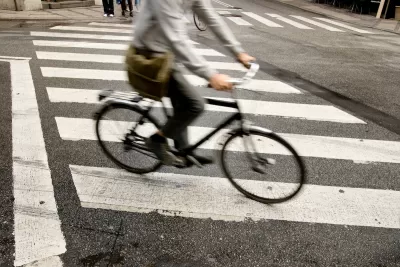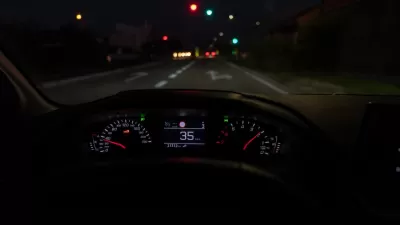Crosswalk laws in most U.S. states don’t offer legal protections to people on bikes, scooters, or mobility devices.

According to a piece by Cara Hamann in the Des Moines Register, “There is a glaring gap in crosswalk laws in the United States, but this loophole is often unknown, so little is being done to fix it.”
Hamann is referring to the fact that many crosswalk laws only explicitly protect pedestrians—people on foot—excluding people on bikes or using wheelchairs, scooters, or other mobility devices. This matters because, in cases where a driver fatally struck a person on a bike or other device, the driver can walk away with no criminal charges.
For Hamann, an injury epidemiologist, “Bicycles, wheelchairs, scooters, and other devices move humans whose lives matter and they should be legally protected in crosswalks just like people on foot.”
The solution, Hamann writes, is simple: “change the word ‘pedestrian’ to ‘persons’” and eliminate the loophole in state laws.
FULL STORY: The most deadly traffic policy you've never heard of

Alabama: Trump Terminates Settlements for Black Communities Harmed By Raw Sewage
Trump deemed the landmark civil rights agreement “illegal DEI and environmental justice policy.”

Planetizen Federal Action Tracker
A weekly monitor of how Trump’s orders and actions are impacting planners and planning in America.

Why Should We Subsidize Public Transportation?
Many public transit agencies face financial stress due to rising costs, declining fare revenue, and declining subsidies. Transit advocates must provide a strong business case for increasing public transit funding.

Understanding Road Diets
An explainer from Momentum highlights the advantages of reducing vehicle lanes in favor of more bike, transit, and pedestrian infrastructure.

New California Law Regulates Warehouse Pollution
A new law tightens building and emissions regulations for large distribution warehouses to mitigate air pollution and traffic in surrounding communities.

Phoenix Announces Opening Date for Light Rail Extension
The South Central extension will connect South Phoenix to downtown and other major hubs starting on June 7.
Urban Design for Planners 1: Software Tools
This six-course series explores essential urban design concepts using open source software and equips planners with the tools they need to participate fully in the urban design process.
Planning for Universal Design
Learn the tools for implementing Universal Design in planning regulations.
Caltrans
Smith Gee Studio
Institute for Housing and Urban Development Studies (IHS)
City of Grandview
Harvard GSD Executive Education
Toledo-Lucas County Plan Commissions
Salt Lake City
NYU Wagner Graduate School of Public Service




























